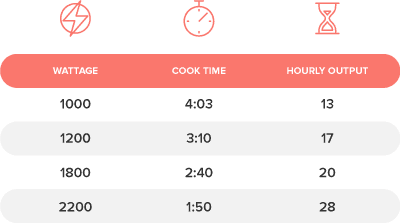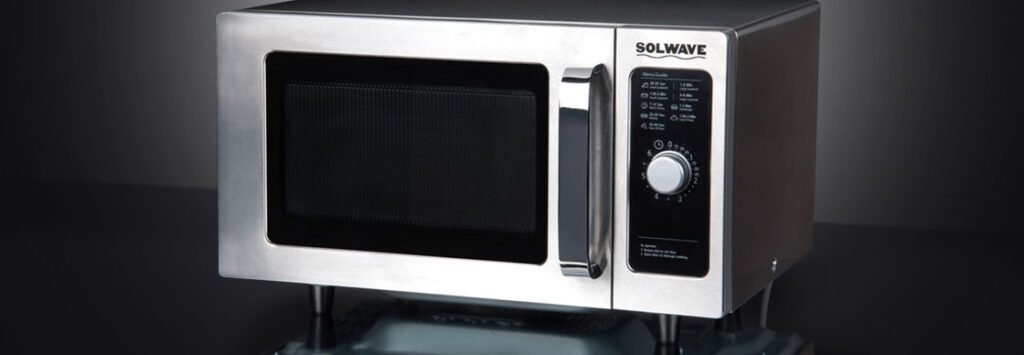
Are you in the market for a new microwave but feeling overwhelmed by the wide range of wattage options available? Look no further! In this article, we will guide you through the process of selecting the perfect microwave wattage that suits your needs. Whether you’re a frequent cook or someone who simply wants to heat up leftovers, we’ve got you covered. By the end of this article, you’ll have the knowledge to make an informed decision and find the ideal microwave wattage for your kitchen. So let’s get started!

This image is property of assets.epicurious.com.
Factors to Consider
When it comes to choosing the perfect microwave for your needs, there are several factors that you need to consider. Cooking time, power levels, space constraints, and energy efficiency are all important considerations to keep in mind. By taking these factors into account, you can ensure that you find a microwave that best suits your lifestyle and cooking preferences.
Cooking Time
One of the key factors to consider when choosing a microwave is cooking time. Microwaves with higher wattage tend to cook food faster than those with lower wattage. If you are someone who is always on the go and needs to heat up meals quickly, a higher wattage microwave would be a suitable choice for you. On the other hand, if you don’t mind waiting a bit longer for your food to heat up, a lower wattage microwave may be sufficient for your needs.
Power Levels
Power levels are another important factor to consider when choosing a microwave. Microwaves with multiple power levels allow you to have greater control over the cooking process. This is particularly beneficial when you are dealing with delicate foods that require gentle heat or when you want to defrost food without cooking it. Having the flexibility to adjust the power levels can significantly enhance your cooking experience.
Space Constraints
Space constraints play a significant role in determining the type of microwave that will work best for you. If you have limited countertop space, a compact countertop microwave may be the ideal choice. On the other hand, if you have ample space in your kitchen and want to save valuable countertop real estate, an over-the-range or built-in microwave might be more suitable. It is important to measure the available space in your kitchen before making a purchase to ensure that the microwave will fit properly.
Energy Efficiency
Energy efficiency is a consideration that should not be overlooked when choosing a microwave. Microwaves that are energy efficient consume less electricity during operation, which can lead to cost savings on your energy bills. Look for microwaves that have an Energy Star rating, as these models are specifically designed to be more energy efficient. By choosing an energy-efficient microwave, you not only benefit financially but also contribute to a greener environment.
Common Wattage Options
Microwave wattage refers to the power output of the microwave oven. The wattage of a microwave affects its cooking speed and performance. Let’s explore the common wattage options available in the market:
700-900 Watts
Microwaves in this wattage range are considered low to medium power. They are suitable for simple tasks such as reheating leftovers, making popcorn, or heating beverages. If you have basic microwave needs and don’t require your food to be cooked quickly, a microwave in this wattage range may be a cost-effective choice for you.
1000-1200 Watts
Microwaves in the 1000-1200 watt range are a popular choice for regular cooking. They offer a good balance between cooking speed and energy consumption. These microwaves are suitable for a wide range of cooking tasks, from reheating leftovers to cooking frozen meals. If you are looking for a versatile microwave that can handle everyday cooking needs, a microwave in this wattage range would be a great fit.
More than 1200 Watts
Microwaves with wattage above 1200 watts are considered high power. These microwaves are ideal for heavy-duty tasks such as defrosting large cuts of meat or cooking casseroles. They have the ability to cook food quickly and efficiently, making them the perfect choice for busy households or those who frequently entertain guests.

This image is property of cdnimg.webstaurantstore.com.
Cooking Needs and Wattage
The wattage of a microwave should be chosen based on your specific cooking needs. Let’s explore the different categories of cooking needs and the ideal wattage range for each:
Microwave for Simple Tasks
If you primarily use your microwave for simple tasks such as reheating leftovers or warming up beverages, a microwave with a wattage of 700-900 should be sufficient. These microwaves provide enough power to quickly heat your food without the need for high wattage.
Microwave for Regular Cooking
For everyday cooking needs, a microwave in the wattage range of 1000-1200 is recommended. This wattage range provides a good balance between cooking speed and energy consumption, allowing you to efficiently cook a wide variety of meals.
Microwave for Heavy Duty Tasks
If you frequently engage in heavy-duty cooking tasks such as defrosting large cuts of meat or cooking casseroles, a microwave with wattage above 1200 is the best choice. These high-power microwaves can handle large quantities of food and cook them quickly and evenly.
Budget Considerations
When choosing a microwave, it’s important to consider both the initial cost and the operating cost.
Initial Cost
The initial cost of a microwave can vary depending on the brand, features, and wattage. Microwaves with higher wattage and more advanced features tend to be more expensive. It’s important to set a budget for yourself and determine how much you are willing to spend on a microwave.
Operating Cost
The operating cost of a microwave is determined by its energy efficiency. Microwaves with higher energy efficiency consume less electricity, resulting in lower energy bills. When comparing different microwaves, look for models with an Energy Star rating, as these are designed to be more energy efficient and can help save you money in the long run.

This image is property of hips.hearstapps.com.
Power Consumption and Energy Efficiency
When it comes to choosing the right microwave, power consumption and energy efficiency are important considerations. Let’s delve deeper into each of these factors.
Energy Star Rated Microwaves
Energy Star is a certification program that identifies energy-efficient products. When choosing a microwave, look for models that have the Energy Star label. Energy Star rated microwaves are designed to consume less energy while providing the same level of performance as standard models. By choosing an Energy Star rated microwave, you can not only lower your energy bills but also contribute to a more environmentally friendly home.
Average Power Consumption
Microwave ovens consume varying amounts of power depending on their wattage and usage. On average, a microwave with a wattage of 700-1200 consumes around 700-1500 watts of power during operation. Higher wattage microwaves may consume more power, but they also cook food faster. It’s important to be mindful of the power consumption of your microwave to help manage your energy usage.
Size and Space Constraints
The size of your kitchen and available countertop or cabinetry space will determine the type of microwave that will work best for you. Let’s explore the different options available:
Countertop Microwaves
Countertop microwaves are the most common type of microwave and are designed to sit on your kitchen countertop. They are easy to install and can be moved around if needed. Countertop microwaves come in a variety of sizes, so you can choose one that fits your available countertop space.
Over-the-Range Microwaves
If you have limited countertop space or prefer a streamlined look in your kitchen, an over-the-range microwave may be the right choice for you. These microwaves are installed above your range or cooktop, saving valuable counter space. However, they do require professional installation and proper ventilation.
Built-in Microwaves
Built-in microwaves are seamlessly integrated into your kitchen cabinetry, providing a sleek and streamlined look. These microwaves are typically installed at eye level or under the countertop. Built-in microwaves require professional installation and may be more expensive than countertop or over-the-range options.

This image is property of cdnimg.webstaurantstore.com.
Performance and Cooking Times
When choosing a microwave, it’s important to consider its performance and cooking times. The wattage and power levels of a microwave play a significant role in determining how quickly and evenly it cooks food.
Faster Cooking Times
Microwaves with higher wattage tend to have faster cooking times. If you need to quickly heat up meals or have limited time to cook, a microwave with higher wattage is the way to go. However, it’s important to note that faster cooking times may result in uneven heating or overcooking if not monitored closely.
Slower Cooking Times
Microwaves with lower wattage typically have slower cooking times. These microwaves are suitable for tasks that require more gentle heating, such as defrosting or melting chocolate. Slower cooking times can also help ensure that food is heated evenly and avoids overheating.
Cooking Versatility and Power Levels
The power levels of a microwave determine the range of cooking options it offers. Let’s delve deeper into the cooking versatility and power levels available in microwaves.
Multiple Power Levels
Microwaves with multiple power levels allow you to have greater control over the cooking process. They offer the flexibility to adjust the power output according to the food you are cooking. If you want a microwave that can handle a variety of cooking tasks, look for one that offers multiple power levels.
Versatile Cooking Options
Different microwaves offer different cooking options to enhance your cooking versatility. Some microwaves come with pre-programmed cooking settings for specific foods, such as popcorn, potatoes, or beverages. Others have advanced features like convection or grilling capabilities, which allow you to bake or grill food in addition to traditional microwave cooking. Consider the types of cooking you often do and choose a microwave that offers the necessary features to accommodate your needs.

This image is property of hips.hearstapps.com.
Types of Microwave Dishes
When using a microwave, it’s important to choose the right dishes that are safe and suitable for microwave cooking. Let’s explore the different types of microwave dishes:
Microwave-Safe Dishes
Microwave-safe dishes are specifically designed to withstand the heat generated by the microwave. These dishes are made of materials that do not absorb microwave energy, ensuring that food is heated evenly and efficiently. Microwave-safe dishes can be made of glass, ceramic, or microwave-safe plastic. Always check the labeling on the dishes to ensure they are safe to use in the microwave.
Non-Microwaveable Dishes
There are certain types of dishes that should not be used in the microwave. These include metal dishes, aluminum foil, dishes with metallic accents or trim, and plastic containers that are not labeled as microwave-safe. Using these non-microwaveable dishes can cause the dishes to melt, ignite, or create sparks, which can damage the microwave or pose a safety hazard. It’s important to use caution and only use dishes that are specifically designated as microwave-safe.
Compatibility with Other Appliances
Lastly, consider the compatibility of the microwave with your existing kitchen appliances and any future appliance upgrades you may have in mind.
Existing Kitchen Appliances
When choosing a microwave, consider how it will fit in with your existing kitchen appliances. You may want to match the color or style of the microwave with your other appliances for a coordinated look. Additionally, you should ensure that the electrical capacity of your kitchen can support the additional appliance. Microwaves typically require a dedicated electrical circuit, so it’s important to consult with a professional electrician if needed.
Future Appliance Upgrades
If you have plans to upgrade other kitchen appliances in the future, consider how your choice of microwave will fit in with those plans. For example, if you plan on installing a new range or cooktop, an over-the-range microwave might be a better choice to create a cohesive and visually appealing kitchen design. It’s always a good idea to consider your long-term plans and potential appliance upgrades when making any major kitchen appliance purchase.
In conclusion, choosing the perfect microwave wattage involves considering factors such as cooking time, power levels, space constraints, energy efficiency, and budget considerations. By carefully evaluating your cooking needs, available space, and desired performance, you can find a microwave that perfectly suits your lifestyle and culinary preferences. Always remember to prioritize safety by using microwave-safe dishes and ensuring the compatibility of the microwave with your existing appliances and future upgrade plans. Happy cooking!






